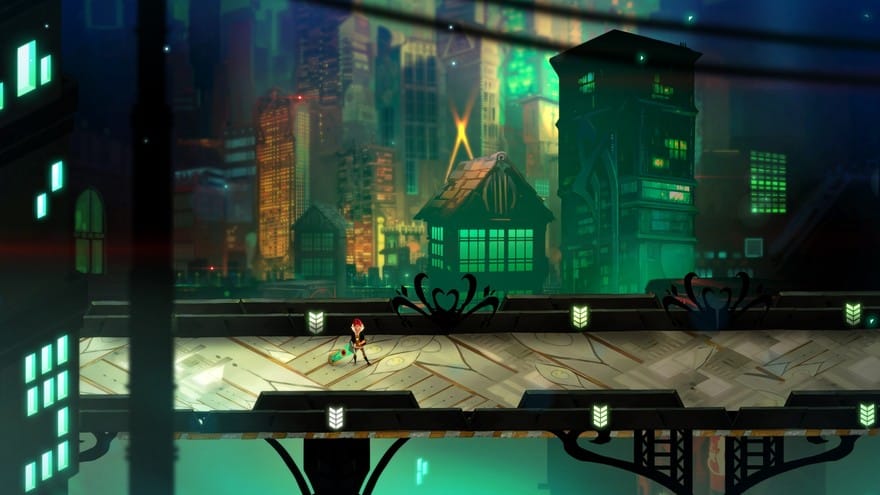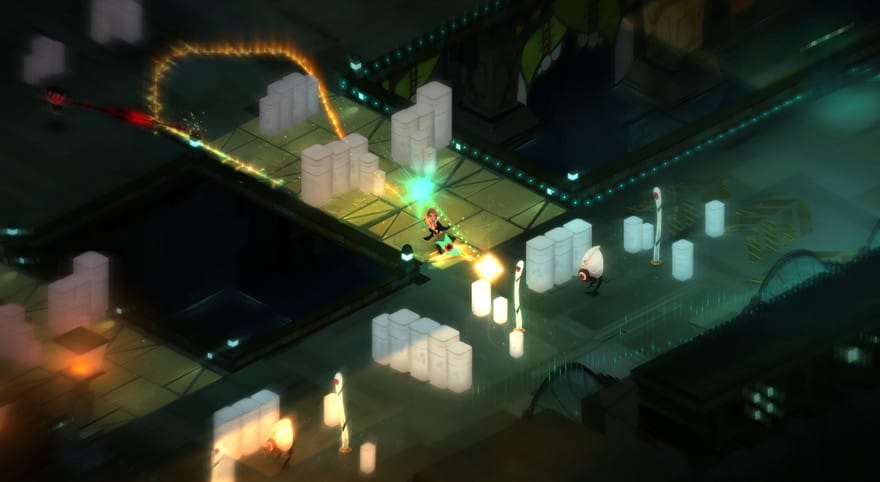Transistor: Supergiant’s accidental spiritual successor

Creation is fickle. An eruption of life in the universe can take billions of years to reach base camp consciousness, and then be obliterated in an instant. It might take one studio half a decade of hard work to make a game, only for it to be critically bamboozled in a matter of hours. So when something works, we’re bound to ask, “What’s next?”
Supergiant Games, the creators of the Bastion, answers that question with Transistor, which falls under the persnickety category of “spiritual successor.” Beloved games have certainly borne that moniker—Chrono Cross, Perfect Dark, and Bioshock come to mind. Committing to this sideways progression, rather than a sequel, allows the developer to create a completely different world while maintaining expectations, artistically and otherwise.
Still, a videogame spiritual successor is a strange beast. A second or third novel could be seen as spiritual successors to previous works, yet authors aren’t held accountable to include, say, a Bahamut summon, or else.

Greg Kasavin, Transistor’s writer and creative director, looks to transcend the concept in a similar fashion. “We haven’t thought of it that way ourselves, which isn’t to say that it’s not the case,” he say. “It’s our second game with the same team and a similar development process and mindset. What we wanted to happen was to stick together as a team and be able to make something new.”
In 2011, Bastion took players’ hearts with a clever sense of story, colorful characters and art design, and a smart, tasteful sense of audio.
Throughout development of their second game, Kasavin found Supergiant coming full circle on more than a few aspects. “We did consciously decide to make another action RPG from an isometric perspective,” he said. “Though, it wasn’t a foregone conclusion. We challenged different aspects and I find it funny looking back that we did all these extensive tests on everything from the perspective to the default camera and came back around with similar decisions. We’re sensitive to conventions. We don’t follow them blindly, at least we don’t intend to. We try not to make assumptions about any aspect of the design.”

Transistor found its own voice, so to speak. Kasavin continued to admit that aspects of Bastion organically fit into their new game, like music, atmosphere, and even the signature narration. “Using voiceover, we’re able to move the story forward at the pace of the person playing instead of interrupting them with cutscenes. In Bastion, the narrator was this omniscient sounding character who is unraveling the story as you make progress. In Transistor, the narrator is a character dealing with the story as it comes, speaking directly to events within the world as they unfold.”
During Transistor‘s development, Supergiant had more time and less constraints than their previous venture. “The only real constraint was our ability to execute on the idea,” he said. “We have to gauge the sort of ambition of the idea to something that we feel like we can deliver on. And that is at the heart of game development for a team of any size, whether it’s one or one thousand.”
Transistor only exists because we made Bastion.
Kasavin hopes that players will set apart their new game from its older brother’s shadow. “On one hand, we can’t talk about this game at all without talking about Bastion—it only exists because we made Bastion. On the other hand, we want it to be able to stand on its own. And it remains to be seen what people think as to whether or not we’ve succeeded in that.”
It’s clear that Transistor was made patience and care, allowing the world to form organically, rather than automatically replicating the mold of success. It just so happens that some of what worked before is working again.
“I hope we can surprise people once again in a positive way,” Kasavin said. “And that means not playing it too similar to what we did in the past, and that’s why it’s a whole new game. And even though we don’t use the term ourselves, Transistor is a spiritual successor by virtue of the fact that it’s made in the same spirit in which we made Bastion.”



